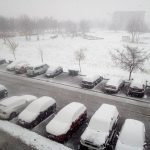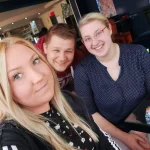Such thoughts aside, as my friend and colleague Iva rightly said in her article, everyone living in Zagreb will have a memory of that horrible morning. It’s always fascinating to me to think how much we as humans continue to live in total ignorance, believing that we are in constant and total control. If a global pandemic in which an organism one can’t even see grinds the whole world to a halt wasn’t enough to show us that isn’t and will never, ever be true, a huge earthquake was a good additional reminder.
I was asleep at the time. It was early in the morning and the sound of Zagreb’s trams and (often poorly maintained) tracks tend to cause somewhat loud noises. Living in the heart of Zagreb, one becomes used to loud noises, be they trams, rubbish trucks or indeed the odd car crash. The lockdown into which Croatia was plunged as the novel coronavirus found its way into the country rendered the Croatian capital unusually quiet, and the sounds to which I had become very accustomed had become somewhat less. It was pleasant.
Back then, before we had all become well and truly done with sometimes rather illogical anti-epidemic measures, horrible infection rate reports and intermittent lockdowns, that time was totally unprecedented and in some warped way, rather exciting. The then significantly quieter Zagreb was filled with other sounds, including birdsong as spring finally began to break through the harsh grip of a long, boring winter.
We didn’t know back then what was to come throughout 2020 and those feelings and sense of naivity now feel so distant. But let’s get back to the point – Zagreb earthquake memories.
I awoke to the sound of what I thought, in my half awake, half asleep state of consciousness, was a train heading at lightening speed towards my building. The sound was absolutely deafening, and I had never heard anything like it. It rattled towards my building, as if coming from a great distance, gaining momentum like a dangerous avalanche having formed from little more than a bit of harmless snow. It only took me a few seconds, maybe three at most, to realise that this was of course no train.
I looked up and saw the plaster on the walls of my apartment begin to crack, a long fault line appearing amid the calm creamy colour like something out of a film. Having grown up in Britain, a calm, favourably positioned country in regard to such natural events, I had only ever experienced two earthquakes, one I slept through and the other did little more than knock a lamp off my table. Traumatic indeed.
The deafening sound grew louder, and the crack got bigger, running along the wall as if dancing with the beat of that terrible sound. An earthquake.
Car alarms began to sound and as I shot up out of bed as the building shook as if made from paper, people living on my street began running out of their buildings, out onto the streets as the police shouted at them for gathering together without masks during the pandemic dominated by a novel virus about which we knew very little back then.
You’re not safe inside. You’re not safe outside either. How on Earth has this happened? 2020 had barely begun and it was already looking Biblical. A plague, a disaster, were locusts and famine next on the list as a punishment? It sounds amusing now, but at the time, it was all so surreal it was difficult to know what to do or what to believe.
Worried faces filled the streets as the aftershocks rolled in and car alarms kept sounding as debris fell from Zagreb’s shamefully neglected facades onto windshields, now cracked and coated with dust. The trams stopped. The police left. People returned indoors to inspect the damage to their homes and the birdsong suddenly became unpleasant. It was eerie.
As night fell, sleeping with that horrible sound in mind and the thoughts of the walls cracking so fresh and vivid wasn’t easy. I’m not a particularly sensitive person, and I tend to let things roll off me, but that event was somehow so deeply disturbing that thoughts of packing an emergency exit bag and leaving it by the front door seemed appealing. Perhaps wrongly, I neglected to do that, and although some aftershocks did happen, such a move was thankfully not needed.
Zagreb’s beautiful, iconic cathedral, apparently forever under some sort of construction, was damaged significantly. The very epicentre of the strong quake, just outside Zagreb, got little attention when compared to the heart of the city as politicians went out to the field to show their faces. The earthquake was a natural disaster which nobody could have predicted or indeed done a thing about even if they could, but it exposed some deep flaws about Zagreb’s administration and the state of the city, as some parts of it are still dotted with rubble and warnings about potential falling debris one year later.
How the Zagreb earthquake memories, which every resident of this city has buried somewhere in the back of their minds, will reflect what will be done in the city’s renovation process remains to be seen. With progress moving at Croatia’s typically slow pace and astronomical figures being stated, it’s difficult to imagine a Zagreb unscarred by this event, which I hope I’ll never experience again.
For more on the Zagreb earthquake and Zagreb earthquake memories, check out our dedicated section.










